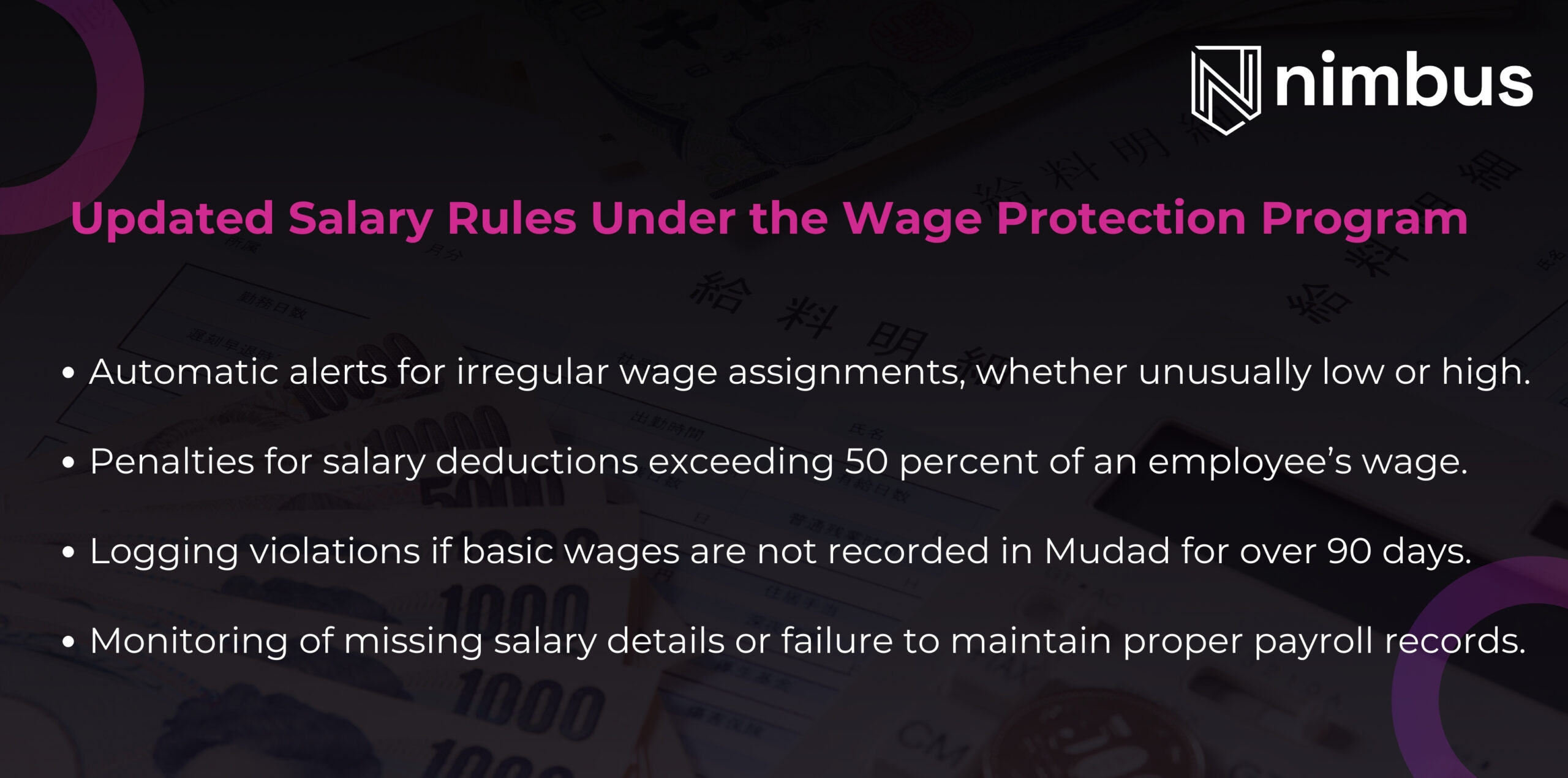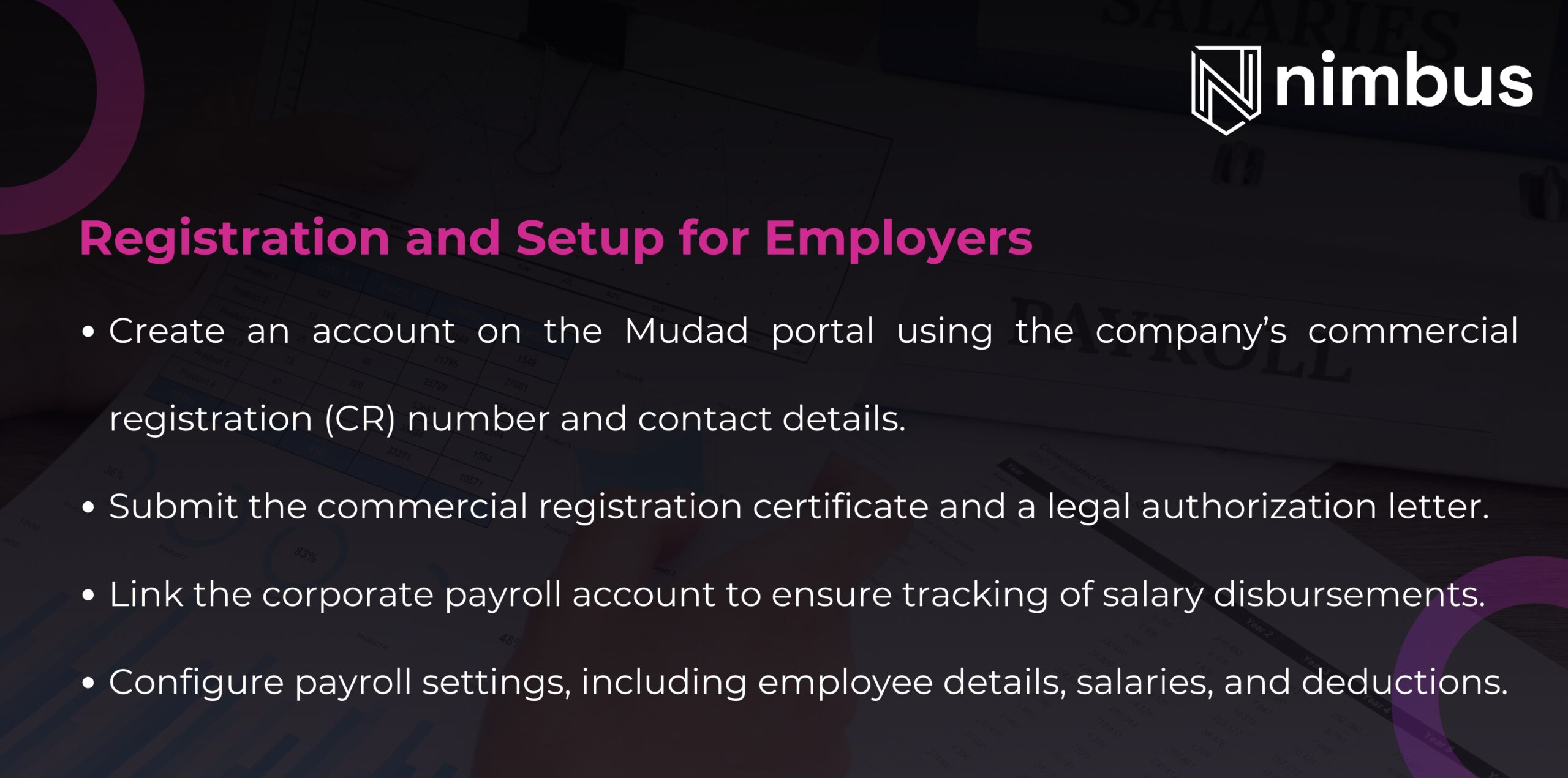Have you ever wondered how digital platforms can reshape payroll management and employee rights in a large economy?
Saudi Arabia is taking a significant step forward with the Mudad payroll system, part of the Wage Protection Program (WPP), to ensure timely, transparent, and fair salary payments for private-sector employees.
These updates, implemented by the Ministry of Human Resources and Social Development (MHRSD), are transforming payroll compliance and providing a safer, more reliable environment for both employers and workers. For companies considering company formation in the KSA, understanding the regulatory environment, including payroll obligations, is crucial.
The Mudad platform is now central to payroll management, aligning with broader efforts to digitize business operations, enforce labor compliance, and enhance financial governance in the Kingdom.
What is Mudad and Why it Matters?
Mudad is a digital payroll and compliance platform developed by the MHRSD to manage wage protection obligations across private companies. Its primary objective is to ensure that salaries are paid on time and recorded accurately.
The system is especially useful for small and medium-sized enterprises (SMEs), which make up a large portion of the Saudi economy. Some major business benefits of Mudad include:
- Centralized payroll processing for private companies.
- Direct integration with Saudi banking channels for secure salary transfers.
- Automated reminders and reporting for compliance with wage regulations.
- Transparent salary information accessible by employees.
The system also connects payroll functions with the Ministry, the General Organization for Social Insurance (GOSI), and other relevant financial institutions, providing a seamless interface for compliance and reporting.
Updated Salary Rules Under the Wage Protection Program
The MHRSD has revised salary rules to strengthen fairness and transparency. Key updates include:

- Automatic alerts for irregular wage assignments, whether unusually low or high.
- Penalties for salary deductions exceeding 50 percent of an employee’s wage.
- Logging violations if basic wages are not recorded in Mudad for over 90 days.
- Monitoring of missing salary details or failure to maintain proper payroll records.
These measures protect employees from wage manipulation and ensure that all payments are processed according to legal standards.
Flexible Salary Withdrawals
A major innovation introduced in July 2025 is the Flexible Salary feature, developed in collaboration with Khazna Financial Technology Company. This service allows employees to access a portion of their earned wages before payday based on the number of days they have worked.
This flexibility provides employees with greater control over their finances, reduces dependency on credit, and enhances workplace satisfaction.
Penalties for Delayed Payroll Submissions
The updated framework also addresses employer compliance failures. If payroll files are not submitted on time, the Mudad system follows a structured escalation process:
- Reminder on the due date.
- Second notification after 10 days.
- Final warning on the 15th day.
- Inspection request to the Ministry’s Inspection Department if no action is taken by the 20th day.
This step-by-step escalation ensures transparency for employees and gives them a clear pathway to resolve issues while encouraging timely payroll submissions by employers.
Handling Delayed Salary Payments
When a salary is delayed, the Mudad platform allows both parties to present their side. Employers have 10 days to provide justification, while employees have three days to accept or reject the explanation. If no response is given, the system defaults to acceptance. However, prolonged delays carry significant consequences including:
- A two-month delay can result in suspension of most government services, except work permits.
- A delay of three months or more leads to complete service suspension, and employees gain the right to transfer to a new employer without needing approval, even if their work permits remain valid.
These rules ensure that employees are protected while encouraging employers to adhere strictly to payroll timelines.
Registration and Setup for Employers
To use Mudad, companies must complete a straightforward registration process and here are the main steps.

- Create an account on the Mudad portal using the company’s commercial registration (CR) number and contact details.
- Submit the commercial registration certificate and a legal authorization letter.
- Link the corporate payroll account to ensure tracking of salary disbursements.
- Configure payroll settings, including employee details, salaries, and deductions.
Once registration is complete, companies can manage payroll efficiently, generate compliance reports, and respond to employee queries.
Payroll Automation and Integration
Mudad brings automation to payroll management, significantly reducing manual errors and administrative burdens. Key features include:
- Automated salary calculations and disbursement through banking channels.
- Batch processing for multiple employee payments.
- Automatic reminders and reporting for timely wage submissions.
- Direct access for employees to review salary, deductions, and benefits.
The platform also supports integration with existing HR and financial systems, allowing seamless data synchronization, onboarding automation, and accurate reconciliation of payroll data with accounting records.
Implications for Business Setup in Saudi Arabia
For businesses looking at business setup in the KSA, understanding and integrating the Mudad system is vital. The platform reflects the Kingdom’s broader vision of digitizing regulatory processes, reducing bureaucratic delays, and ensuring transparent governance.
Investors and entrepreneurs must factor payroll compliance and employee rights into their operational strategies from day one.
Supporting Vision 2030 Goals
The Mudad payroll platform aligns with Saudi Arabia’s Vision 2030 objectives by:
- Promoting financial inclusion through accessible payroll systems.
- Strengthening labor governance and compliance.
- Enhancing investor confidence by ensuring reliable labor practices.
- Encouraging digital adoption across SMEs and larger corporations.

All in all, Saudi Arabia’s updated Mudad payroll platform and salary system reforms are transforming the way businesses handle employee payments. Employers are held accountable for timely and accurate salary disbursement, while employees gain access to flexible salary options and protection against wage delays.
For international businesses exploring business setup services in Saudi Arabia, understanding these regulations is crucial because compliance with Mudad reflects a broader commitment to operational excellence, employee satisfaction, and alignment with Saudi Arabia’s Vision 2030.


